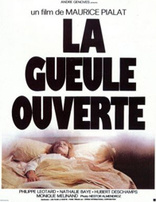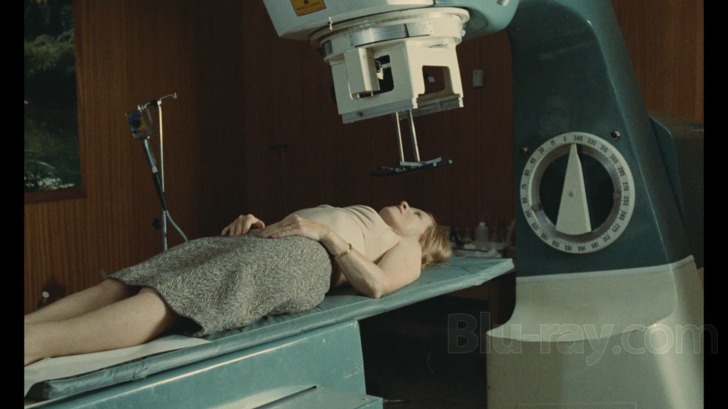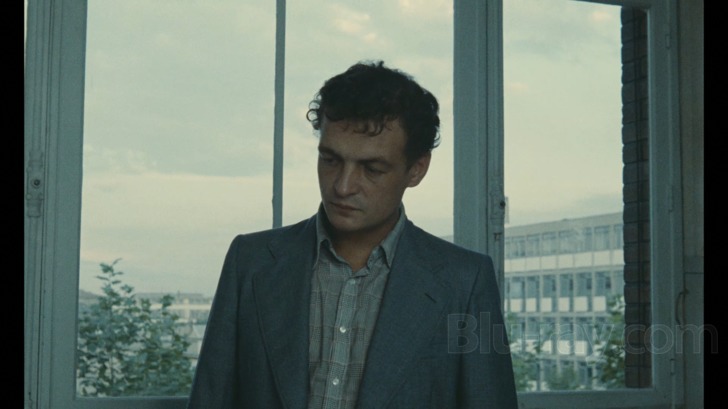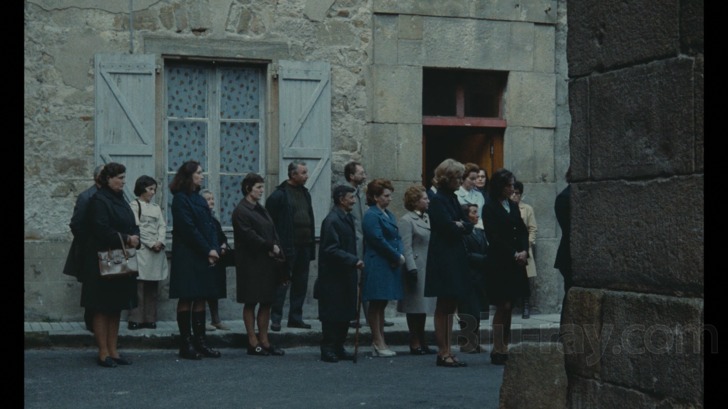La Gueule Ouverte Blu-ray Movie
HomeLa Gueule Ouverte Blu-ray Movie 
The Mouth AgapeCohen Media Group | 1974 | 82 min | Not rated | No Release Date

Price
Movie rating
6.9 | / 10 |
Blu-ray rating
| Users | 0.0 | |
| Reviewer | 4.0 | |
| Overall | 4.0 |
Overview
La Gueule Ouverte (1974)
Monique Mélinand portrays a woman in the late stages of terminal illness. She — and her prone body — become the locus around which gather her son Philippe (Philippe Léotard), his wife Nathalie (Nathalie Baye), and Monique’s husband Roger (Hubert Deschamps). In short order, Monique recedes into the background of Philippe’s and Roger’s network of respective adulteries. But as the final, crushingly eloquent succession of shots starts to unreel, we are once more reminded that, in the work of Maurice Pialat, that which seems absent ultimately makes its presence felt with terrible force.
Starring: Hubert Deschamps, Philippe Léotard, Monique Mélinand, Nathalie BayeDirector: Maurice Pialat
| Foreign | 100% |
| Drama | 80% |
Specifications
Video
Video codec: MPEG-4 AVC
Video resolution: 1080p
Aspect ratio: 1.66:1
Original aspect ratio: 1.75:1
Audio
French: Dolby Digital 2.0
Subtitles
English SDH
Discs
Blu-ray Disc
Single disc (1 BD)
Playback
Region A (B, C untested)
Review
Rating summary
| Movie | 4.0 | |
| Video | 4.0 | |
| Audio | 3.0 | |
| Extras | 2.0 | |
| Overall | 4.0 |
La Gueule Ouverte Blu-ray Movie Review
Reviewed by Jeffrey Kauffman May 19, 2016Note: This film is available as part of The Films of Maurice Pialat: Volume 1.
In my recent Death
Walks Twice: Two Films by Luciano Ercoli Blu-ray review, I mentioned how it’s likely that talking about giallo to even the most
ardent film buff would probably result in a response offering only one of two names, Dario Argento or Mario Bava. Similarly, if one were to ask
a film fan to name a French director whose work spanned the 1960s through the 1980s, my hunch is most folks would tend to gravitate
toward iconic names like Jean-Luc Godard, François Truffaut or Claude Chabrol. Nouvelle Vague so famously subsumed so much of
modern (meaning post-World War II) French cinema that some creatives (like Chabrol in fact) found themselves akin to square pegs being (or
at least attempted at being) thrust into round holes. Maurice Pialat is not a name known to many Western film lovers, even those
who consider themselves Francophiles, and it’s interesting to note that Pialat often works in a style that would frankly make him more at
home with his nearby European neighbors, the Italians, since Pialat frequently favors a neorealistic approach that is long on character, gritty
verisimilitude, and a sometimes lax approach toward traditional plot structure and three act “arcs”. Pialat also tends to eschew some of the
stylistic flourishes that populate the Nouvelle Vague catalog, especially in terms of editing. Instead of, well, Breathless cutting (sorry), Pialat often indulges in long, drawn out single takes that
allow his actors to fully explore the nuances of their characters, even if at times dialogue is fitfully minimal. It’s a technique that immediately
puts Pialat at odds with many of his (more) famous contemporaries, and may account at least in part for Pialat’s strange lack of recognition
on this side of the pond. Cohen Film Collection, quickly becoming a haven for cineastes (if it hasn’t already), is helping to ameliorate that
problem by releasing a trio of Pialat’s work spanning from 1974 to 1980, along with a revealing documentary about the director.

The superb Broadway lyricist Fred Ebb (Cabaret) wrote one of his most trenchant lines for the opening song of his musicalization of Zorba the Greek:
Life is what you doThe line was so trenchant, in fact, that when the musical was revived decades after its original Broadway run (this time with Anthony Quinn singing and dancing in the title role), that second half of the thesis was changed to “‘til the moment you die”. Personally, the first formulation seems more properly fatalistic in an authentic Greek way than the somewhat bowdlerized second version, and the first iteration might be a near perfect epigraph for at least part of what is happening in the often sad and, yes, trenchant The Mouth Agape.
While you’re waiting to die.
The Mouth Agape opens in a hospital, with Monique (Monique Melinand) undergoing some kind of test that looks kind of like an MRI. Her son Philippe (Philippe Léotard) is in attendance and seems relieved when an attending nurse assures him there’s nothing to worry about, that Monique may need a cane and has a bone spur, but that’s it. In one of the film’s kind of odd elisions, after some interstitial dialogue, it’s revealed that Monique actually is mortally ill and only has a few weeks left to live. I may frankly have missed some subtext, but it was unclear to me in the film’s opening scenes whether Monique knew this at the initial appointment, or found out about it later. It’s a small plot point in the overall scheme of things but perhaps serves as an example that Pialat is not one to hand hold his audience, instead expecting them to perceive context and relationships out of what’s provided, which at times is somewhat discursive.
The film takes an unsparing and surprisingly unsentimental look at Monique’s decline and ultimate demise (it’s obvious from the get go that her death is coming, so this is not much of a “spoiler”). Playing around the fringes of this already sad story is the family’s dysfunction, one exemplified by a long history of infidelity vis a vis Nathalie’s estranged husband Roger (Hubert Deschamps), a behavior he’s evidently passed down to his son Philippe. Philippe’s indiscretions are roiling his relationship with his wife Nathalie (Nathalie Baye). Despite an obviously gripping emotional subtext running rampant throughout The Mouth Agape, the film is rather amazingly restrained, eschewing histrionics for a kind of depressive interior atmosphere that may make it a hard pill to swallow for those who want things filled with over the top interactions.
Pialat attempts to weave a bit of Mozart’s Così fan tutte into both the soundtrack and the overall ambience of the film. It’s an ironic choice, since the opera’s title can be translated (more or less, anyway) as “women are like that”. It’s obvious that in the case of The Mouth Agape, it’s actually the men who are “like that”, a gender reversal of sorts that will strike many (including probably most women) as being completely believable.
La Gueule Ouverte Blu-ray Movie, Video Quality 

La Gueule ouverte is presented on Blu-ray courtesy of Cohen Film Collection with an AVC encoded 1080p transfer in 1.66:1. This is probably the grainiest looking of the three features offered in The Films of Maurice Pialat: Volume 1, with a gritty, textured quality that almost assumes the look of Super 16 at times (the IMDb lists this as having been shot on 35mm). That actually only tends to support the film's verité ambience, something that legendary cinematographer Nestor Almendros' "fly on the wall" framings also help to achieve. The many hospital scenes have a somewhat bluish tint, while a lot of scenes in the bedroom where Monique spends her last days are somewhat ironically honey hued. Blacks are slightly milky which in addition to some slightly undercooked contrast leads to minimal shadow detail in some dark and/or nighttime scenes. Densities are consistent and there is no damage of any kind to report.
La Gueule Ouverte Blu-ray Movie, Audio Quality 

Perhaps surprisingly all three features in The Films of Maurice Pialat: Volume 1 sport Dolby Digital 2.0 mono tracks. The French release of Loulou, the only Pialat film in this set to have appeared previously on Blu-ray, featured a lossless DTS-HD Master Audio Mono track. As longtime readers of my Cohen reviews know, I took the label to task for their earlier authoring of discs which tended to default to lossy Dolby Digital tracks rather than also included lossless tracks, but in this case there are no lossless tracks. That's ultimately not a huge deal, given the relatively small scale sonic ambitions of all three films, though it's at least arguable that the Mozart quotes in La Gueule ouverte might have gained a bit of "oomph" in a lossless setting. Dialogue and effects are both rendered cleanly on all three tracks, with no damage of any kind to warrant concern.
La Gueule Ouverte Blu-ray Movie, Special Features and Extras 

Cohen has spread the three feature films and supplements across the three discs in this set in a somewhat unusual way. The Mouth Agape and Graduate First share one BD-50 with no supplemental content, while Loulou is on its own BD-50 with its supplemental features. The third disc contains the following content:
- Maurice Pialat: Love Exists (1080p; 1:25:10) is a really interesting overview of Pialat's work, documenting a number of his early films while also giving some fascinating referents from films which colored Pialat's youth. This is a great place to start for those unfamiliar with Pialat's oeuvre.
- Interview with Patrick Grandperret and Arlette Langmann (1080p; 11:04)
- Original Trailer (1080p; 2:29)
- 2016 Re-Release Trailer (1080p; 1:11)
- Deleted Scenes (1080p; 11:26)
- Interview with Micheline Pialat (1080p; 11:56)
- Interview with Nathalie Baye (1080p; 8:06)
- Original Trailer (1080p; 2:56)
- 2016 Re-Release Trailer (1080p; 1:26)
La Gueule Ouverte Blu-ray Movie, Overall Score and Recommendation 

If you need a break from reading Elisabeth Kübler-Ross' On Death and Dying, my advice is to stick with some film other than The Mouth Agape. This is a pretty devastating treatment of end of life issues filtered through a rather uniquely French perspective that includes sexual dalliances and two generations of family dysfunction. Never "fun" to watch, but almost hypnotically compelling, The Mouth Agape comes Highly recommended.
Similar titles
Similar titles you might also like
(Still not reliable for this title)

Compartment No. 6
Hytti nro 6
2021

Cemetery of Splendor
2015

Panique
Panic
1946

To Joy
Till glädje
1950

Je tu il elle
I You He She
1974

The Hero
নায়ক / Nayak: The Hero
1966

The Silence
Tystnaden
1963

The Marriage of Maria Braun
Die Ehe der Maria Braun
1978

The Passion of Anna
En passion
1969

After the Rehearsal
Efter repetitionen
1984

The Rite
Riten / The Ritual
1969

24 Frames
2017

Vladimir et Rosa
Vladimir and Rosa
1971

Lotte in Italia
Struggle in Italy
1971

Loveless
Нелюбовь / Nelyubov
2017

Eight Hours Don't Make a Day
Acht Stunden sind kein Tag
1972-1973

Thirst
Törst
1949

La Chienne
The Bitch
1931

Les rendez-vous d'Anna
The Meetings of Anna
1978

Satantango
Sátántangó
1994